There are a few different ways you can build a website. Choosing the most advanced option out there isn’t necessarily the best way to go. What matters is the end result. The priority is having a website up and running that serves its purpose and does everything you expect it to do. But depending on what purpose your website has, there are various options out there. In this post, we’re going to compare building a website using a CMS (like WordPress) vs code frameworks (like Ruby On Rails and Bootstrap).
Note: It’s important to make the distinction that when we say “framework” in the context of this post, we’re not referring to a WordPress theme framework, but instead a standardized library of code for building websites from the ground up.
We’ll start off by explaining how both approaches work and afterwards, we’ll use the following five metrics to help you decide on how to build your website:
- Flexibility/Level of Control
- Ease of Use
- Required Time, Knowledge & Effort
- Budget
- Security
Now, let’s get to it!
Functionality
How Do Frameworks Work?
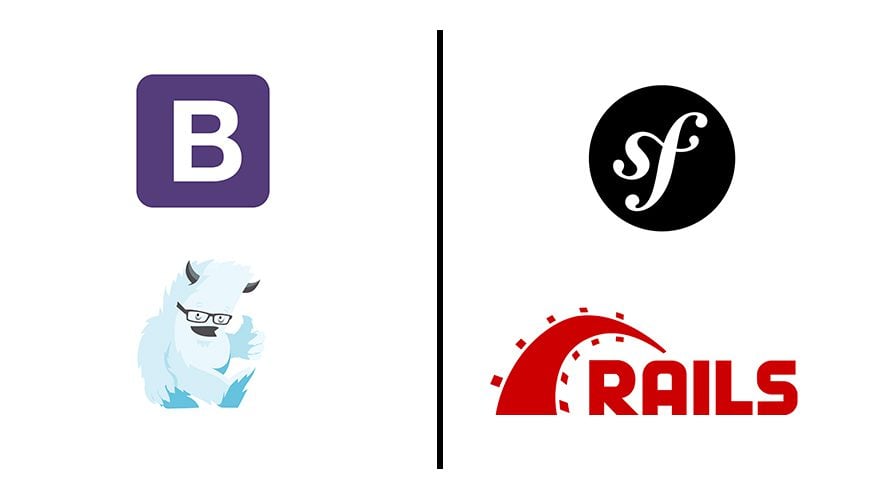
There are two types of frameworks out there. Frameworks that help you build the backend of your website (e.g. Ruby on Rails) and frameworks that allow you to set up the frontend (e.g. Bootstrap.) Frameworks that are used for the frontend are often called CSS Frameworks.
A framework is a ‘library’ made of standardized code that makes it easier for developers and designers to create a custom website. Using frameworks to build your website means that you’re going to reuse a certain development structure and build upon that structure to achieve exactly what you had in mind. Concretely, that means you’ll already have the base code which you can continue working upon without having to recode the development structure from scratch. The backend and frontend of your website are connected to a data layer (e.g. MySQL.)
How Do CMS Platforms Work?
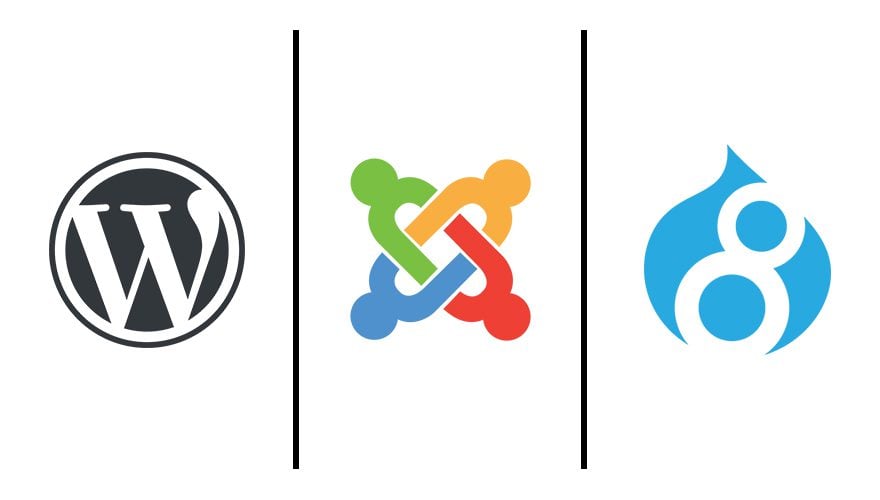
CMS platforms are web applications built upon frameworks. It’s kind of an inception thing where people have built a web application (e.g. WordPress) to allow you to build websites more easily and visually. When using a CMS, the backend and data layer structures are already taken care of. These two things require a lot of code knowledge, so that part is taken out of your hands. However, that also means your website’s frontend will only be able to handle what your backend allows it to. Usually, developers create their own web applications using frameworks when a customer’s need cannot be met with a CMS platform.
CMS vs Frameworks
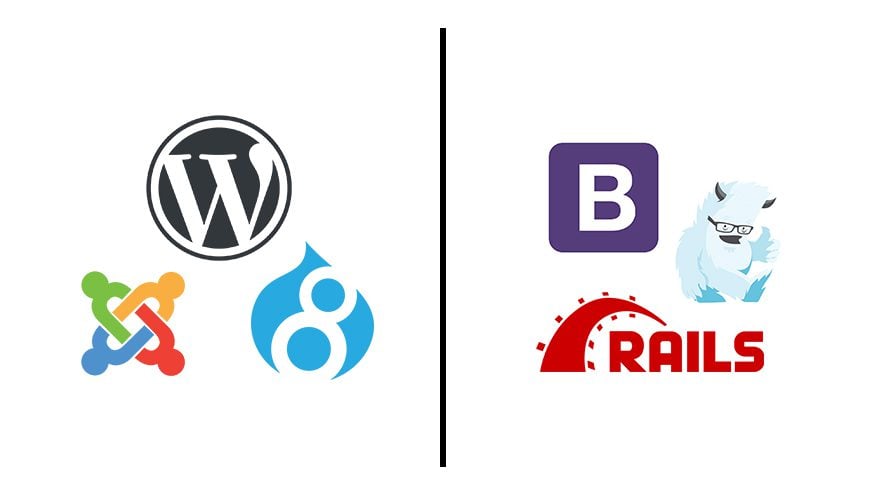
1. Flexibility/Level of Control
To help you decide if you should choose a CMS, such as WordPress, or if you should go with frontend and backend frameworks, we’re going to compare both options. To make an accurate comparison, we’ll use 5 different metrics. The first one being flexibility and level of control.
WordPress, for instance, does a great job at offering you different ways to design your website. Especially if you consider all the WordPress themes, builders and plugins out there that help you get a lot of things done. You can design beautiful websites with great functionality. WordPress doesn’t limit you to creating simple websites only. With the right plugins and themes within reach, you can build membership websites and eCommerce websites that have great user experience.
Although a CMS can help you built various websites, it’s not as advanced as frameworks are. With frameworks, the sky is the limit. You can decide what your website needs and make your entire development process revolve around it. You can build whatever you had in mind and you won’t be limited as long as you have the time, resources and knowledge for it.
? Winner: Frameworks
2. Ease of Use
Ease of use is the second metric we’re going to handle when comparing CMS platforms, like WordPress, with frontend and backend frameworks. When it comes to using a framework or a CMS, using a CMS is definitely a lot easier. CMS platforms do the hard work for you. They take care of the backend and the data layer and allow you to focus on how you want the frontend to look. In many cases, you don’t even need to know how to code at all to set up a website using a CMS.
Plus, if you look at all the WordPress page builders out there, such as Divi, building a website has become as simple as dragging and dropping design elements onto your pages. Frameworks have done a great job at making things easier for website developers as well. Instead of having to code literally everything from scratch, there’s a foundation people can use. Many CSS frameworks, such as Bootstrap, offer templates for people to use. But for someone who’s barely gotten in touch with code, going that route is a risk to take.
? Winner: CMS
3. Required Time, Knowledge & Effort
It goes without saying that building a website using frameworks obviously takes up a lot more time than building a website using a CMS platform. Luckily, it does take a lot less time than creating a website from scratch using no frameworks at all.
But although CMS platforms take some of the hard work over, it definitely isn’t the same as working with a website builder such as Weebly. A CMS platform allows you to, and sometimes even requires you to, make custom modifications using custom code when you want to achieve a more advanced result. But in reality, there are a ton of themes, builders and plugins out there that help you minimize your workload.
Know that whichever one you pick, it takes a huge amount of work, time and effort to build a website with great user experience. But building a website with frameworks is harder because of the coding knowledge it requires and the freedom you have of getting everything set up just the way you like it.
? Winner: CMS
4. Budget
Whether you’re creating a website using a CMS platform or a framework, the budget you have will play the biggest roles in your decision making. Budget and time are barely separatable. Full stack developers usually charge anywhere between $30-$150 an hour to create a website. Web designers, that use CMS platforms to create websites, charge between $20-$75. Besides those numbers, you should take into account that custom coding a website using frameworks takes more time than creating a website using a CMS platform.
The more complex and customized you want your website to be, the more expensive. This counts for both CMS platforms and frameworks. But there are a lot more DIY website creators out there that design their own website instead of hiring someone to do it.
? Winner: CMS
5. Security
Both CMS platforms and frameworks (especially open-source ones) have one main vulnerable spot. Their code is public to the world which means that attacking them is easier for hackers. But in cases where CMS platforms are built upon open-source frameworks as well, the public code is double the amount which makes a CMS platform even more vulnerable. Luckily, experienced developers contributing to CMS platforms and developers contributing to frameworks keep an eye on security threats and hop in as soon as possible to keep improving security day by day. Fighting security threats is an ongoing thing but both manage to reduce the risk users have to take when choosing one of them.
? Winner: Frameworks
Final Thoughts
In this post, we’ve compared using a CMS vs frameworks to build your website. We started by explaining how both methods work and afterwards, we’ve compared them using several metrics. In the end, it’s about which one of the possibilities matches your needs the most and what your budget allows you to use. If you have any questions or suggestions, make sure you leave a comment in the comment section below!
Featured Image by Pro Vector Stock / shutterstock.com






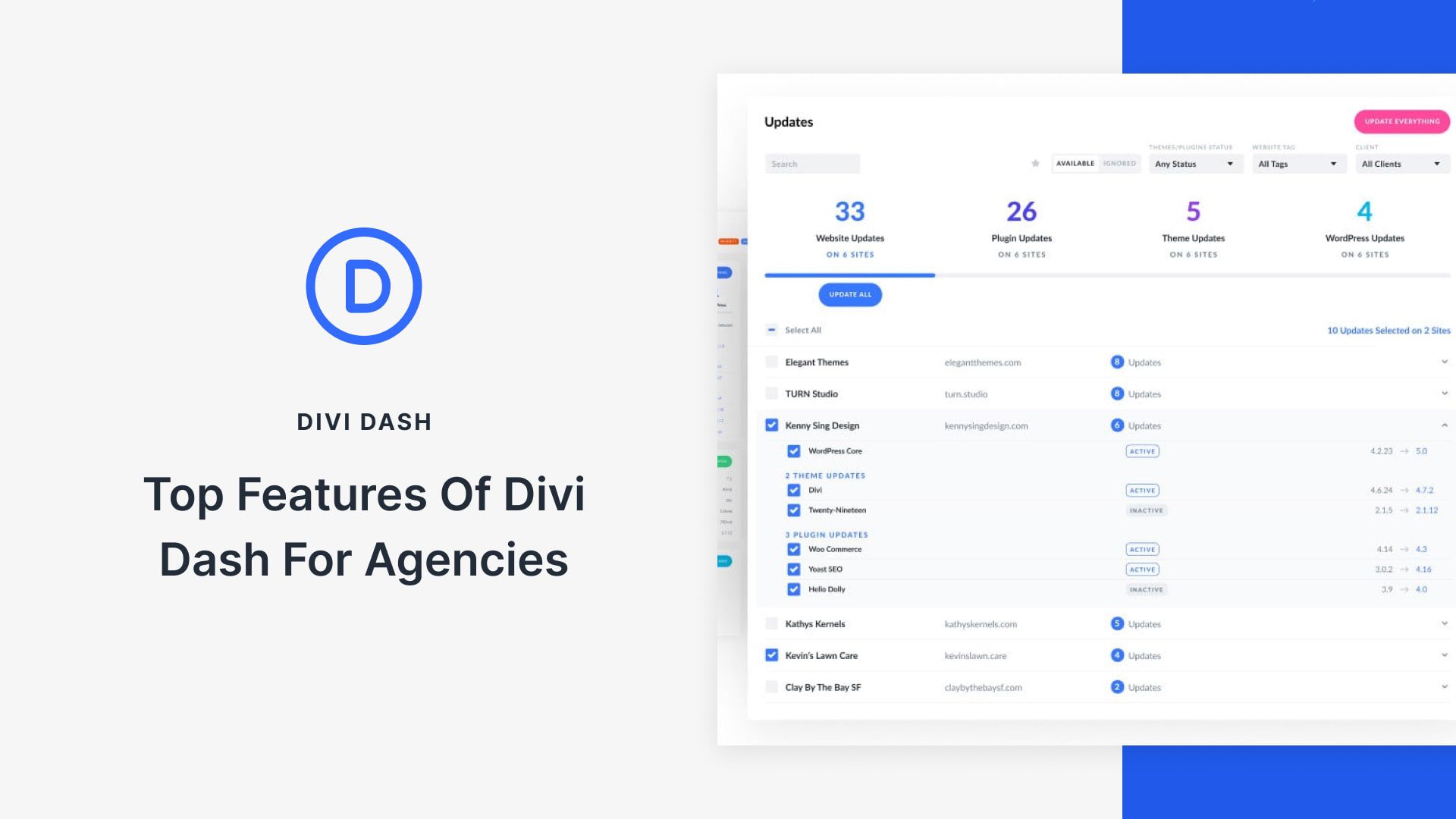
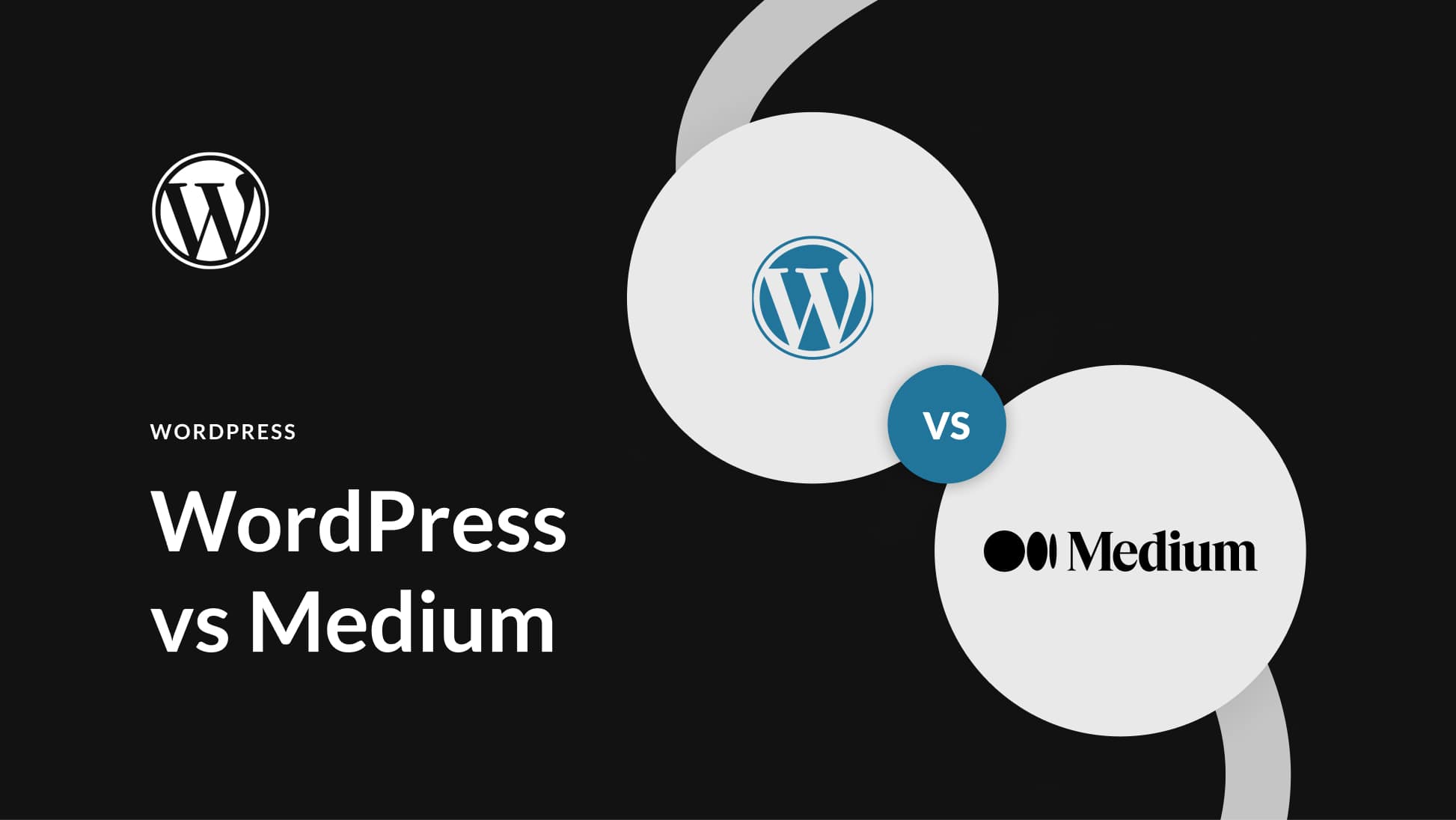

As at now, i would love to go for CMS.. Framework seems to me like it’s going to take a longer time to complete, high budget and advanced technical skills
You can’t go wrong with CMS in general and WordPress in particular. Good read though.
With CMS like WordPress most of the general functionality and design are easily available at low cost.
Theme like Divi and it’s page builder is a new revolution and used by most of the non coders.
We can focus more on content and marketing stuff which is big plus.
For small and medium budget projects CMS is the best solution.
Nice one, now I know the difference and how to get it better. Will not mind to know where to learn this online I mean the framework.
Thanks Donjete. And I like Shane’s comment about learning HTML and CSS from frameworks. I believe Divi represents the best web builder community on the planet.
Thanks for giving all the possible options. In due time I know I’ll be picking the right one for my own site.
Thanks for this post. Indeed both have their distinct advantages. I prefer using CMS a lot because or ease of use, speed and cost-effectiveness. However, I sometimes use frameworks like bootstrap and others integrated to the CMS should there be a need for more flexibility and customization.
Divi – Open bug bounty program 🙂
My first websites were with a Bootstrap framework and it was long and tedious work that until I tried WordPress and never looked back.
The one good thing about it is that it taught me HTML and CSS code.
So would always recommend thet you try and do at least two websites with a framework as it can teach you a lot.
Loved it! Thank you so much!
awesome post guys. as always. some people just don’t know how complex a website can be depending on the nature of their business. hopefully when they read this, they will have more in depth understanding benefits of these platforms.
What a great post and comparison. I think this will be very useful for lots of small businesses owners that may not know which way to go for their project.
Thanks
I’m going to ride the WordPress and Divi train to the moon. It makes too much sense for me to get off early in the game. I’d like to learn how to program someday but who knows when that will be…
When evaluating whether to use a CMS or a framework, my metrics aren’t “what’s easier/more secure/flexible,” it’s “will my client want to be able to edit content down the line.” The answer is almost always “yes,” so for my agency it’s not a choice between CMS and frameworks, but more “do I want to use a framework WITH my CMS.” I’ve encountered projects where I WISH I had used Bootstrap to quicken development time, but that’s another story. ^_^
I feel now a days the gap between CMS and frameworks is minimizing. I feel 90% of web applications now a days don’t need frameworks. If you feel frameworks are suitable for your project feel free of employing a very good developer or else you end up with so much bad code which attracts more security threats.
Front end can be designed to your likes on both. Frameworks still has upper hand when it comes to flexibility. But both CMS and frameworks need code supervision while development. What ever you choose maintaining coding and developing standards are necessary.
Thank you for the thoughtful reply, you answered a couple of questions that I had.
Definitely not ‘the premier builder’.
ET was very late to the party and started developing front-end builders years after it as was available on the market from other providers. They have a very good product, but still – not the top choice.
Then what is the top choice?
A very wise article, personally I have always had the concern of implementing a website with frames; to date I have always developed them with CMS. Maybe one day I decide to try it, for the moment happy with the DIVI constructor.
This is a great, simple explanation. As I build solely in WordPress, I sometimes struggle to clarify the pros and cons. I will refer them to this article, and am sharing on Facebook.
Thanks for all your continual great content.
Good Article with nice comparison. Thanks
Great article. Good read. Thanks 🙂
Thank you for the comparison it’s very useful. What about other ‘metrics’ like: performance, responsiveness, SEO, animation?
I think these metrics are more about flexibility.
SEO and Animation are a question of the right plugin – tie. In Performance and responsiveness on the other the framework is the clear Winner.
thanks you,
Nice post. Thank you. While I agree with your section on budget, it does not go far enough. Costs for a website are not just incurred when it is built, but across the full lifecycle that includes updates and patches. Unless the necessary technical resources are on staff and are regularly tending to updates, subscribing to a CMS is usually a much lower total cost of ownership.
Thanks for your post! I think the better way is using both. CMS to management the content and the framework to look&feel.
You can get Both with WordPress. Bootstrap is a Framework and a part of a bunch of WordPress themes.
Excellent post, love the insights I receive from Elegent Themes…keep up the great work!!
Very apropos, and insightful. No doubt complimentary to elegant themes. But elegant themes is a/the premier CMS builder
You explained very easily and which is better for which one